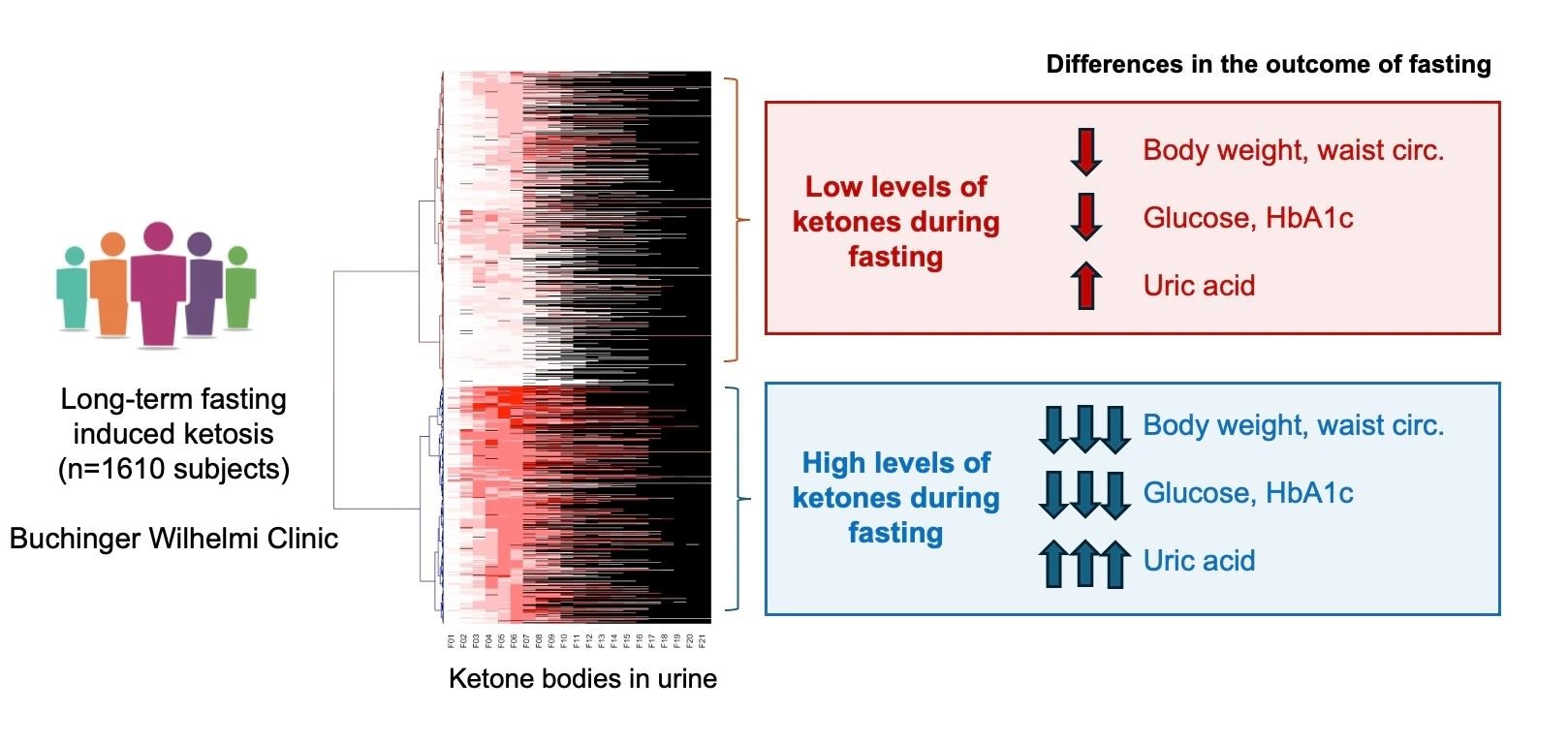Long-term fasting is a potent non-pharmacologic intervention for chronic disease prevention and management. It normalizes glucose and lipid metabolism, reduces oxidative stress, restores gut microbiota balance, and has anti-inflammatory effects. Nevertheless, fasting-induced ketosis is often compared to diabetic ketoacidosis. The metabolic switch to endogenous energy sources is a hallmark of fasting.
Glucose and insulin levels drop when food intake is interrupted, leading to glucagon secretion and glycogen breakdown into glucose. Lipolysis occurs when glycogen reserves are exhausted, releasing fatty acids into the bloodstream as the energy source. In the liver, fatty acids are converted into ketone bodies. Ketone bodies are energy-rich and water-soluble and can be transported to peripheral tissues for oxidation, allowing for ATP synthesis.
 Study: Long-Term Fasting-Induced Ketosis in 1610 Subjects: Metabolic Regulation and Safety. Image Credit: RHJPhtotos / Shutterstock
Study: Long-Term Fasting-Induced Ketosis in 1610 Subjects: Metabolic Regulation and Safety. Image Credit: RHJPhtotos / Shutterstock
About the study
In the present study, researchers examined the interindividual differences in the dynamics of fasting-induced ketosis. People aged 18–91 who participated in a fasting program at a clinic were included. Individuals with type 1 diabetes, cachexia, dementia, anorexia nervosa, cerebrovascular insufficiency, or cognitive diseases were excluded.
 Graphical Abstract
Graphical Abstract
Participants underwent a medical examination before fasting. A day before fasting, a 600-kcal vegetarian diet was served. A laxative was administered on the first day of fasting. During fasting, fresh fruit juice (250 ml), vegetable soup (250 ml), and honey (20 g) were provided. Participants were advised to consume two to three liters of herbal tea or non-caloric water daily.
The daily calorie intake ranged between 75 kcal and 250 kcal. The program also consisted of daily physical activity alternating with rest. Ovo-lacto-vegetarian food was reintroduced on the last fasting day. Blood samples were obtained for measuring ketonemia as β-hydroxybutyrate levels. Urinary acetoacetate excretion was- assessed using sodium nitroprusside tests.
Ketostix strips were used to evaluate ketosis. Emotional and physical well-being was assessed. Lipid profiles, glycemic indicators, blood count, thyroid-stimulating hormone, and coagulation parameters were also measured. Calorie loss after ketone body production was estimated using 24-hour urinary volumes and the calorific value of ketone bodies.
Findings
The study included 1,610 people. First, the team compared the correlation between ketonuria (urinary acetoacetate levels) and ketonemia (blood β-hydroxybutyrate levels) in 32 people. They found that the semi-quantitative measure of urinary acetoacetate was a convenient, non-invasive method that accurately reflected ketosis induced by long-term fasting.
Moreover, the cumulative calorie loss during fasting in these 32 individuals varied between 124 kcal and 1468 kcal. On average, 56.2 kcal/day were lost as ketone bodies. Those with the highest physical activity during the fasting program showed the fastest increase in ketonemia. In the whole cohort, some individuals excreted traces of ketones while others excreted higher levels.
Higher ketonuria was observed in people who did not consume fruit juice and honey. A subgroup of 179 participants with no missing data described their intake during the first five days of fasting. The team classified their calorie intake into quartiles. The lowest quartile comprised 45 people with a daily average intake of 98 kcal, with 31 high-ketonuria and 14 low-ketonuria individuals. This group corresponded with those who consumed only soup.
The highest quartile comprised 44 individuals (19 were high ketonuric and 25 were low ketonuric), with an average intake of 228 kcal. The team also investigated whether other factors influenced ketonuria. People with high ketonuria were younger, male, with lower high-density lipoprotein and urea and higher body weight. The reduction in glycated hemoglobin and glucose levels due to fasting was less pronounced in those with low ketonuria.
Body weight and waist circumference changes were more pronounced in high ketonuric subjects. Uric acid levels increased by 206 µmol/L in high ketonuric subjects and 97 µmol/L in low ketonuric individuals. Changes in ketonuria correlated well with those in uric acid levels. Blood pressure, well-being, cholesterol, and triglyceride levels were not different between low and high ketonuria subjects.
Conclusions
In sum, the study showed that long-term fasting-induced ketosis did not result in physiologically unhealthy levels. Gender, age, physiological status, and physical activity influenced ketosis. Carbohydrate intake modulated and not suppressed ketosis. Overall, the results suggest that individuals’ characteristics could predict the outcome of long-term fasting. This may lead to the establishment of personalized strategies for long-term fasting.
Journal reference:
- Grundler F, Mesnage R, Ruppert PMM, Kouretas D, Wilhelmi De Toledo F. Long-Term Fasting-Induced Ketosis in 1610 Subjects: Metabolic Regulation and Safety. Nutrients, 2024, DOI: 10.3390/nu16121849, https://www.mdpi.com/2072-6643/16/12/1849